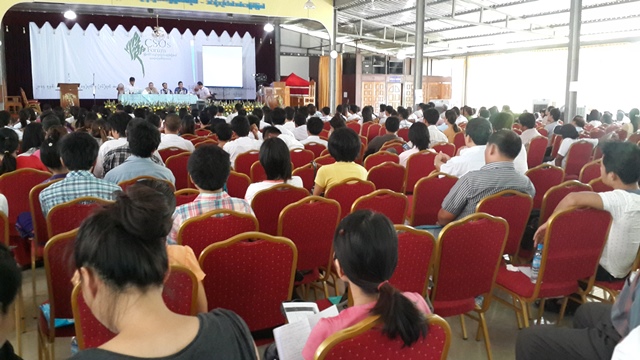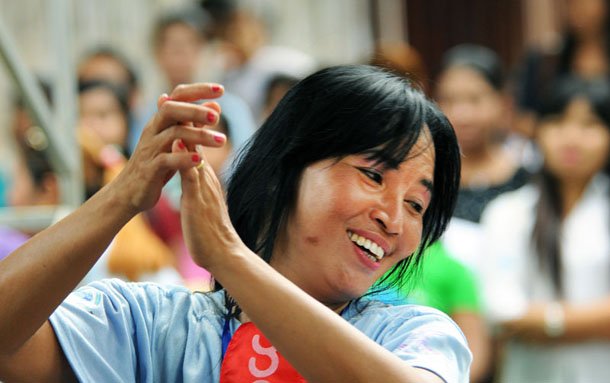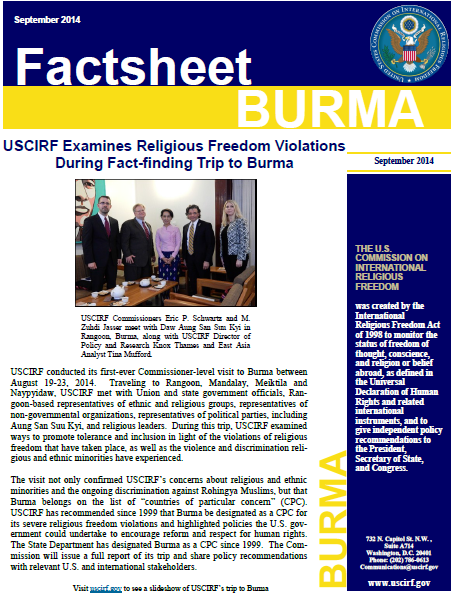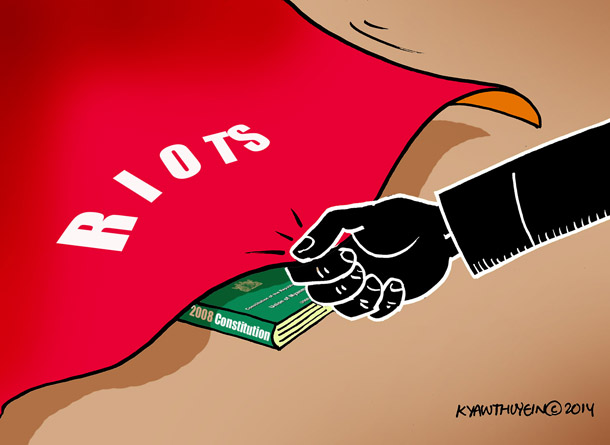Posts Tagged ‘Violence’ (71 found)
Myanmar: A Tipping Point for Rohingya Rights?
 Two years after a wave of violence hit the region, Myanmar’s Rakhine State has become a segregated zone. Two million ethnic Rakhine live apart from 1.2 million stateless Rohingya, who are trapped inside displacement camps or barred from leaving their villages. Ending this segregation and protecting the rights of the Rohingya are necessary components of Myanmar’s move toward democracy. However, the Rakhine leadership has rejected – both politically and with force – any reintegration of the two communities, and it is seeking to exclude the Rohingya from any role in the state’s development, distribution of resources, and political representation. […]
Two years after a wave of violence hit the region, Myanmar’s Rakhine State has become a segregated zone. Two million ethnic Rakhine live apart from 1.2 million stateless Rohingya, who are trapped inside displacement camps or barred from leaving their villages. Ending this segregation and protecting the rights of the Rohingya are necessary components of Myanmar’s move toward democracy. However, the Rakhine leadership has rejected – both politically and with force – any reintegration of the two communities, and it is seeking to exclude the Rohingya from any role in the state’s development, distribution of resources, and political representation. […]
Over 650 Myanmar/Burma Civil Society Actors Speak Out on the Reality of the Transition
 The forum titled, “Civil Societies’ Review on Myanmar/Burma’s Transition Process: Prospects for 2015 and Beyond”, held on 15 – 17 October 2014 at the Myanmar Christian Fellowship of the Blind Center in Rangoon, brought together over 650 representatives from 257 organizations and networks from across the country and border areas to discuss and strategize a wide range of key issues currently facing Burma in the context of the recent economic and political reforms since 2011. This is the first forum of this scale to assess the reform and the wide range of problems currently facing Burma.
The forum titled, “Civil Societies’ Review on Myanmar/Burma’s Transition Process: Prospects for 2015 and Beyond”, held on 15 – 17 October 2014 at the Myanmar Christian Fellowship of the Blind Center in Rangoon, brought together over 650 representatives from 257 organizations and networks from across the country and border areas to discuss and strategize a wide range of key issues currently facing Burma in the context of the recent economic and political reforms since 2011. This is the first forum of this scale to assess the reform and the wide range of problems currently facing Burma.
Despite the hailed “transition to democracy,” exalted particularly by the international community, civil society organizations (CSOs) spoke of the decades old challenges that remain unresolved, the stagnation of the reform process, and new emerging issues, in addition to the need for meaningful inclusion of the voices of civil society, democratic opposition forces, ethnic peoples, women and youth in the reform process.
The forum addressed six core issues; (1) law reform, (2) peace and conflict, (3) media, hate speech and communal violence, (4) Parliament, Government and accountability, (5) economic reform and foreign direct investment, and (6) the international community’s role and involvement, which were discussed under six panel discussions and six workshops. The forum produced a statement that gave concrete recommendations from civil society groups to the Burma Government, United Nations, international governments and international non-governmental organizations (lNGOs) […]
• • •Hundreds Gather in Rangoon to Mark World Peace Day
 RANGOON — At several sites in Rangoon on Sunday, hundreds of activists gathered to mark the International Day of Peace and call for an end to conflict in Burma.
RANGOON — At several sites in Rangoon on Sunday, hundreds of activists gathered to mark the International Day of Peace and call for an end to conflict in Burma.
A festive mood prevailed at the Women’s Peace March, one of three peace rallies held in the city this weekend, where several hundred women belonging to various women’s organizations showed up wearing blue shirts emblazoned with the peace symbol and a slogan ‘No Women, No Peace.’ […]
• •Burma: USCIRF Examines Religious Freedom Violations During Fact-finding Trip to Burma
 USCIRF conducted its first-ever Commissioner-level visit to Burma between August 19-23, 2014. Traveling to Rangoon, Mandalay, Meiktila and Naypyidaw, USCIRF met with Union and state government officials, Ran-goon-based representatives of ethnic and religious groups, representatives of non-governmental organizations, representatives of political parties, including Aung San Suu Kyi, and religious leaders. During this trip, USCIRF examined ways to promote tolerance and inclusion in light of the violations of religious freedom that have taken place, as well as the violence and discrimination reli-gious and ethnic minorities have experienced.
USCIRF conducted its first-ever Commissioner-level visit to Burma between August 19-23, 2014. Traveling to Rangoon, Mandalay, Meiktila and Naypyidaw, USCIRF met with Union and state government officials, Ran-goon-based representatives of ethnic and religious groups, representatives of non-governmental organizations, representatives of political parties, including Aung San Suu Kyi, and religious leaders. During this trip, USCIRF examined ways to promote tolerance and inclusion in light of the violations of religious freedom that have taken place, as well as the violence and discrimination reli-gious and ethnic minorities have experienced.
The visit not only confirmed USCIRF’s concerns about religious and ethnic minorities and the ongoing discrimination against Rohingya Muslims […]
• • •Dispatches: What Burma’s Census Missed
The preliminary results of Burma’s first nationwide census since 1983 were released in Rangoon last Saturday, providing an answer to the vexing question of the actual population, estimates of which varied between 44 to 59 million for a decade. The new tally (minus some low-population areas of northern Karen State and Kachin State not included because of security concerns) is 51.4 million […]
• • •Statement on USCIRF Visit to Burma
This is our first Commissioner-level visit to the country. We have had meetings with Union and state government officials, Rangoon-based representatives of ethnic and religious groups, representatives of non-governmental organizations, representatives of political parties, including Aung San Suu Kyi, and religious leaders. We traveled to Rangoon, Mandalay, Meiktila, and Naypyidaw. In Meiktila, we welcomed the chance to visit camps for persons from both the Muslim and Buddhist communities who were displaced by spasms of violence in March 2013 […]
• • •Multi-Faith Network Urges Secretary Kerry to Raise Religious Freedom Violations with Burmese Government
Members of the US-based International Religious Freedom (IRF) Roundtable, a multi-faith informal group of organizations and individuals advocating for freedom of religion or belief, have written to US Secretary of State John Kerry ahead of his visit to Burma, urging him make it a priority to discuss reported violations of freedom of religion or belief with the government […]
• • •Burma Must Find a Path to a More Tolerant Society
 The streets of Mandalay, which just recently drew over 20,000 people in support of National League for Democracy and 88 Generation Peace and Open Society’s joint campaign to amend Section 436 of the Constitution in support of democratic reform, remain deserted this last week as many business owners closed their shutters in fear, following serious unrest in the city. In the second largest city in Burma, violent mobs took over the streets, leaving two people dead and dozens injured. Some stated that over “70 police were here but did nothing,” as Buddhist mobs torched a school in a Muslim area. Ironically the international community has mostly stayed silent in the wake of the recent events when their actions are needed to protect the people of Burma, especially the most vulnerable communities, more than ever.
The streets of Mandalay, which just recently drew over 20,000 people in support of National League for Democracy and 88 Generation Peace and Open Society’s joint campaign to amend Section 436 of the Constitution in support of democratic reform, remain deserted this last week as many business owners closed their shutters in fear, following serious unrest in the city. In the second largest city in Burma, violent mobs took over the streets, leaving two people dead and dozens injured. Some stated that over “70 police were here but did nothing,” as Buddhist mobs torched a school in a Muslim area. Ironically the international community has mostly stayed silent in the wake of the recent events when their actions are needed to protect the people of Burma, especially the most vulnerable communities, more than ever.
The series of events began on 1 July, just hours after the extremist Buddhist monk, and leader of the anti-Muslim 969 movement, Wirathu, picked up a questionable post from the social media site Facebook that highlighted an alleged rape of a Buddhist woman committed by two Muslim brothers. According to David Mathieson, a senior researcher for Human Rights Watch, Wirathu, who is based in Mandalay, appeared to have played “a pivotal role” in inciting the unrest, fanning tensions by spreading accusations with religious inferences, while calling for action against the two Muslim brothers who own a teashop in the same area where his monastery is located […]
• • •Statement on Anti Muslims Violence in Mandalay
Burmese Muslims Association strongly condemns anti-Muslim violence that has erupted in recent days in Mandalay, the second largest city in Burma. The violence that has occurred is not simply a result of sectarian conflicts. It is without doubt a well-planned operation, carried out by a group of well-trained thugs–which has tacit impunity and free license from the Thein Sein’s government–not only to cause a great deal of physical harm and injury against Muslims, a helpless minority group in Burma, but also to instil immense psychological terror and mental anguish, during the Muslim holy month of Ramadan […]
• • •Outbreak of Religious Violence and Hate Speech in Burma Must Be Stopped
United to End Genocide today called on President Obama and other government leaders of the world to denounce the outbreak of hate speech and violence in Mandalay Burma and make it clear that the government of Burma will be held fully accountable for how it responds […]
• • •








 All posts
All posts